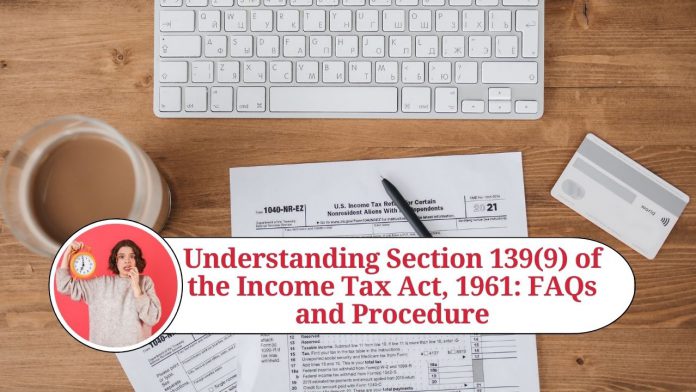Introduction:
The Income Tax Act, 1961 is a comprehensive piece of legislation that governs taxation in India. One of the sections of the Act that has been the subject of much discussion and debate is Section 139(9). This section deals with the rectification of errors in income tax returns. In this blog, we will explore Section 139(9) in detail.
What is Section 139(9)?
Section 139(9) of the Income Tax Act, 1961 provides for rectification of errors in an income tax return. This section enables an assessee to rectify any mistake or omission in their return of income after it has been filed. This provision can be used by an assessee to rectify any error or omission in the return of income within a prescribed time frame.
When can Section 139(9) be invoked?
Section 139(9) can be invoked in the following situations:
- When an assessee discovers an error or omission in their income tax return after it has been filed.
- When the assessing officer detects an error or omission in the income tax return filed by the assessee.
What are the time limits for invoking Section 139(9)?
An assessee can invoke Section 139(9) within four years from the end of the assessment year in which the income tax return was filed. For example, if the income tax return for the assessment year 2022-23 was filed on 31st July 2022, the assessee can invoke Section 139(9) till 31st March 2027.
What is the procedure for invoking Section 139(9)?
The procedure for invoking Section 139(9) is as follows:
- The assessee should file an application in writing to the assessing officer, stating the nature of the mistake or omission in the income tax return.
- The application should be filed within the prescribed time frame.
- The application should be accompanied by the necessary supporting documents.
What happens after an application is filed under Section 139(9)? After an application is filed under Section 139(9), the assessing officer will examine the application and the supporting documents. If the assessing officer is satisfied that there is a mistake or omission in the income tax return, they will rectify the mistake or omission and issue a rectification order.
Conclusion:
Section 139(9) of the Income Tax Act, 1961 is a useful provision for an assessee who discovers an error or omission in their income tax return. This provision enables an assessee to rectify any mistake or omission in their return of income after it has been filed. The procedure for invoking Section 139(9) is simple and straightforward. However, it is important to note that an application under this section should be filed within the prescribed time frame.
Other Related Blogs: Section 144B Income Tax Act
Frequently Asked Questions (FAQs)
Q: What is Section 139(9) of the Income Tax Act, 1961? A: Section 139(9) of the Income Tax Act, 1961 provides for rectification of errors in an income tax return.
Q: Who can invoke Section 139(9)? A: An assessee can invoke Section 139(9) to rectify any mistake or omission in their return of income.
Q: When can Section 139(9) be invoked? A: Section 139(9) can be invoked within four years from the end of the assessment year in which the income tax return was filed.
Q: What is the procedure for invoking Section 139(9)? A: The procedure for invoking Section 139(9) involves filing an application in writing to the assessing officer stating the nature of the mistake or omission in the income tax return and submitting necessary supporting documents.
Q: What happens after an application is filed under Section 139(9)? A: After an application is filed under Section 139(9), the assessing officer will examine the application and the supporting documents. If they find a mistake or omission in the income tax return, they will issue a rectification order.
Q: Can Section 139(9) be invoked if the assessment has already been completed? A: No, Section 139(9) cannot be invoked if the assessment has already been completed. In such cases, an assessee will have to file an appeal with the appropriate authority.
Q: Is there any fee for invoking Section 139(9)? A: No, there is no fee for invoking Section 139(9).




















